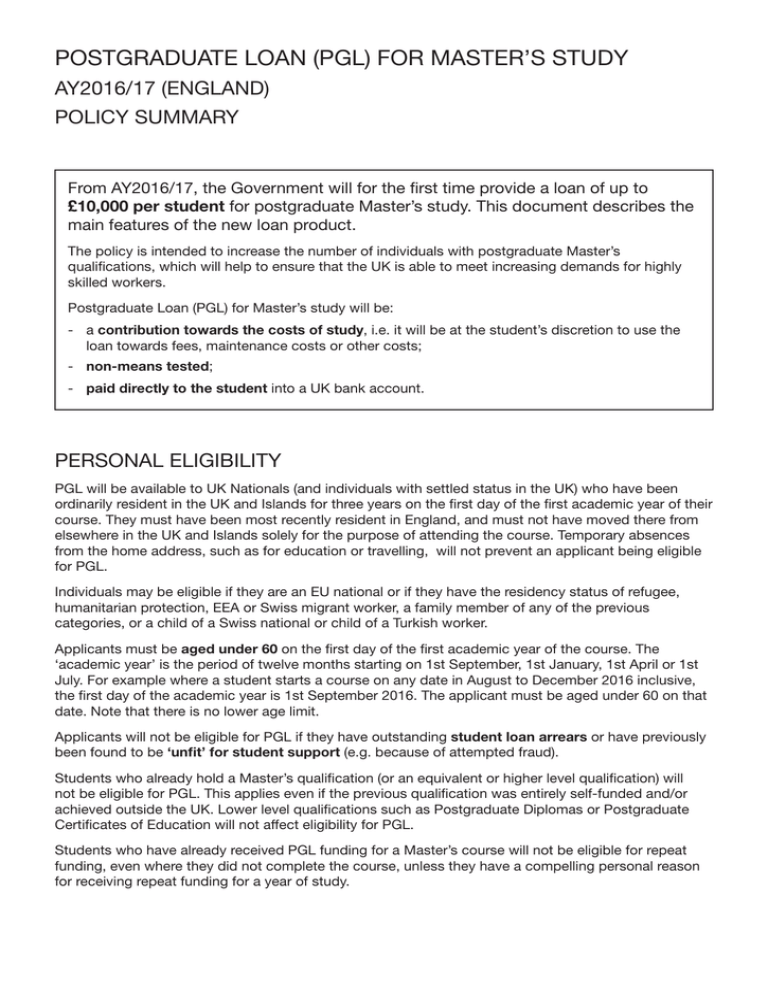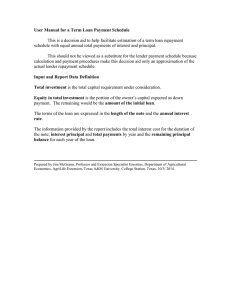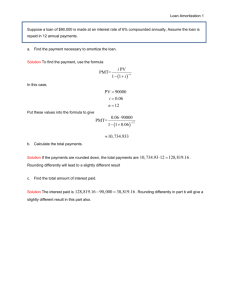POSTGRADUATE LOAN (PGL) FOR MASTER’S STUDY AY2016/17 (ENGLAND) POLICY SUMMARY
advertisement

POSTGRADUATE LOAN (PGL) FOR MASTER’S STUDY AY2016/17 (ENGLAND) POLICY SUMMARY From AY2016/17, the Government will for the first time provide a loan of up to £10,000 per student for postgraduate Master’s study. This document describes the main features of the new loan product. The policy is intended to increase the number of individuals with postgraduate Master’s qualifications, which will help to ensure that the UK is able to meet increasing demands for highly skilled workers. Postgraduate Loan (PGL) for Master’s study will be: -a contribution towards the costs of study, i.e. it will be at the student’s discretion to use the loan towards fees, maintenance costs or other costs; - non-means tested; - paid directly to the student into a UK bank account. PERSONAL ELIGIBILITY PGL will be available to UK Nationals (and individuals with settled status in the UK) who have been ordinarily resident in the UK and Islands for three years on the first day of the first academic year of their course. They must have been most recently resident in England, and must not have moved there from elsewhere in the UK and Islands solely for the purpose of attending the course. Temporary absences from the home address, such as for education or travelling, will not prevent an applicant being eligible for PGL. Individuals may be eligible if they are an EU national or if they have the residency status of refugee, humanitarian protection, EEA or Swiss migrant worker, a family member of any of the previous categories, or a child of a Swiss national or child of a Turkish worker. Applicants must be aged under 60 on the first day of the first academic year of the course. The ‘academic year’ is the period of twelve months starting on 1st September, 1st January, 1st April or 1st July. For example where a student starts a course on any date in August to December 2016 inclusive, the first day of the academic year is 1st September 2016. The applicant must be aged under 60 on that date. Note that there is no lower age limit. Applicants will not be eligible for PGL if they have outstanding student loan arrears or have previously been found to be ‘unfit’ for student support (e.g. because of attempted fraud). Students who already hold a Master’s qualification (or an equivalent or higher level qualification) will not be eligible for PGL. This applies even if the previous qualification was entirely self-funded and/or achieved outside the UK. Lower level qualifications such as Postgraduate Diplomas or Postgraduate Certificates of Education will not affect eligibility for PGL. Students who have already received PGL funding for a Master’s course will not be eligible for repeat funding, even where they did not complete the course, unless they have a compelling personal reason for receiving repeat funding for a year of study. COURSE ELIGIBILITY The student must start the course in AY2016/17 or later (i.e. on or after 1st August 2016). The course may be provided by: -an authority funded HE Provider in the UK; or -an alternative provider with degree awarding powers in the UK. Note that the course may have an overseas element but this cannot exceed 50% of the total course. One and two year full-time courses are eligible for support. Part-time courses are also eligible, and are subject to a minimum 50% intensity requirement. Note that where the student is studying a two year full-time course on a part-time basis, all payments will be made over the first two years of study. Eligible courses may be taught or research based, and include professional Master’s courses such as MBAs. There are no subject restrictions. The student can attend an eligible course anywhere in the UK or study an eligible course by distance learning in England (subject to restrictions on personal eligibility). Examples of courses that are eligible for Postgraduate Loan funding include the following: • MSc (Master of Science) • MA (Master of Arts) • MPhil (Master of Philosophy) on entry • MRes (Master of Research) on entry • LLM (Master of Law) • MLitt (Master of Letters) • MFA (Master of Fine Arts) • MEd (Master of Education) • MBA (Master of Business Administration) Master’s courses that are currently funded by the undergraduate support system, such as integrated Master’s and Master of Architecture, will not be eligible for PGL. Neither will other postgraduate qualifications that do not result in a Master’s qualification, such as a Postgraduate Diploma. PAYMENT No payments will be released until the applicant has supplied their valid National Insurance Number (NINO) where they have one. There is no minimum loan request amount. Students can amend the amount of loan requested up to one month before the end of the academic year, but cannot request less than has been paid. Payments will be released following receipt of confirmation from the HE Provider that the student is in study and on track to complete the course within the specified course duration. This must be confirmed at the start of each academic year of the course. Payments of PGL will be made in three equal instalments per academic year, scheduled as follows: Payment 1: Course start date as advised by the HE Provider* Payment 2: 4 months after the course start month (last Wed of month) Payment 3: 7 months after the course start month (last Wed of month) *Payment on this date depends on the HE Provider confirming the student is in study. CHANGE OF CIRCUMSTANCES Transfers between eligible postgraduate Master’s courses are permitted. Where the new course is at a different HE Provider, the new HE Provider must notify SLC of the transfer before any future payments will be made to the student. This ensures that students are registered at the correct HE Provider before future instalments are released. Repeat years of study will generally not be funded (even where the student did not complete a previous postgraduate course, or requested less than the maximum loan amount). A repeat year will only be funded where the student can prove compelling personal reasons for repeating an academic year. Further funding is not available where the student does not complete the course in the specified course length. However students can suspend and resume their course (no payments are made during suspension periods). Withdrawals should be notified to SLC immediately so that payments are not made when the student is no longer in study. This will be closely monitored by SLC to ensure compliance to the current policy. Any payment made after the student leaves study will be treated as a loan overpayment. REPAYMENT Postgraduate Loans will be repaid under income contingent repayment terms. The repayment terms differ from those that apply to undergraduate student loans. Interest will accrue at a rate of RPI + 3% on all outstanding PGL balances. The repayment due date for PGL balances will be 6th April following the academic year in which the course is completed (or following withdrawal, where this applies). Note that repayments through HMRC will not start before 6th April 2019. Voluntary repayments can be made at any time without penalty. The UK repayment threshold will be £21,000 in tax year 2019/20. The equivalent monthly threshold is £1,750 and the weekly threshold is £404. Those who are repaying from overseas will have a threshold applied which is based on the cost of living in their country of residence. Repayments from overseas will be made directly to SLC. The thresholds will be frozen until April 2021; any future changes to the thresholds will be confirmed in due course. The repayment amount will be 6% of income above the relevant threshold. Repayments will be made concurrently with any other student loan repayments due, i.e. borrowers repaying both loans will have a 15% total deduction taken from their salary. Borrowers may switch to direct debit repayments when they are scheduled to repay in full within two years. Write off of any outstanding balance will take place on the 30th anniversary of the date that the loans become due for repayment, or when the customer dies or becomes permanently unfit for work, unless the borrower has outstanding student loan arrears.




